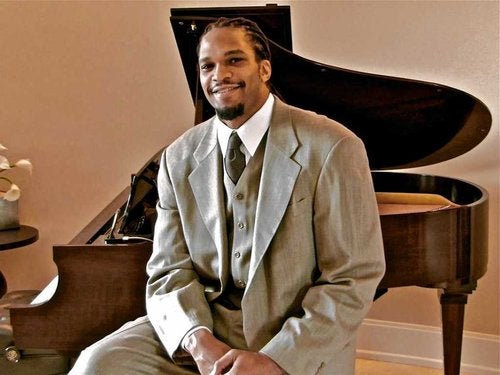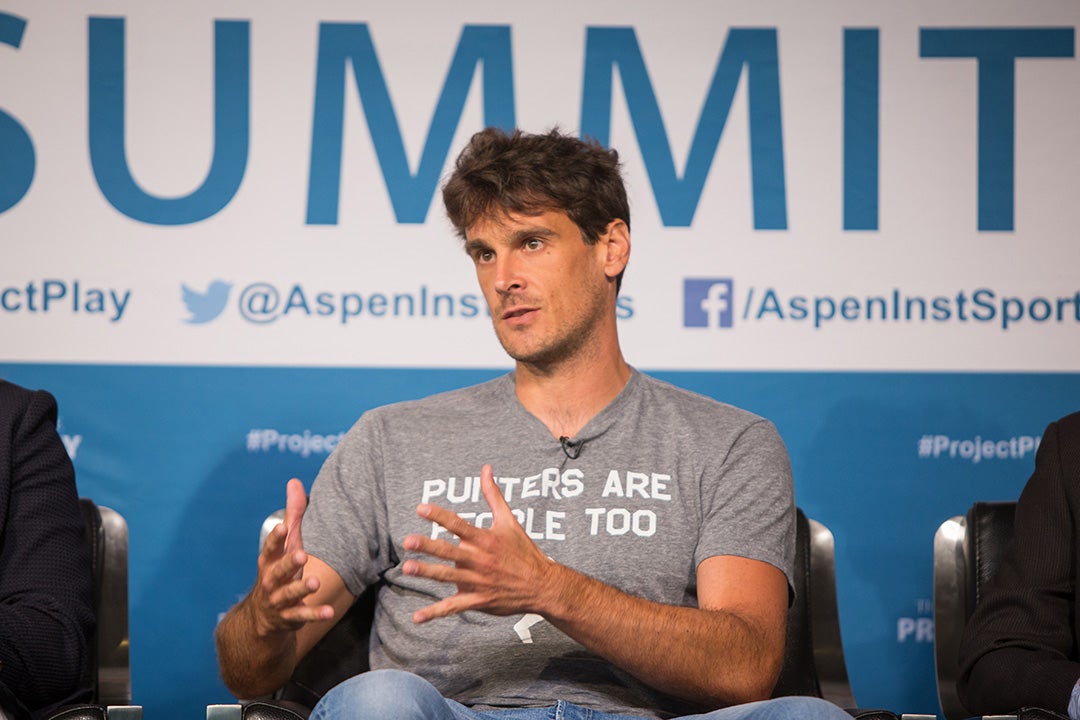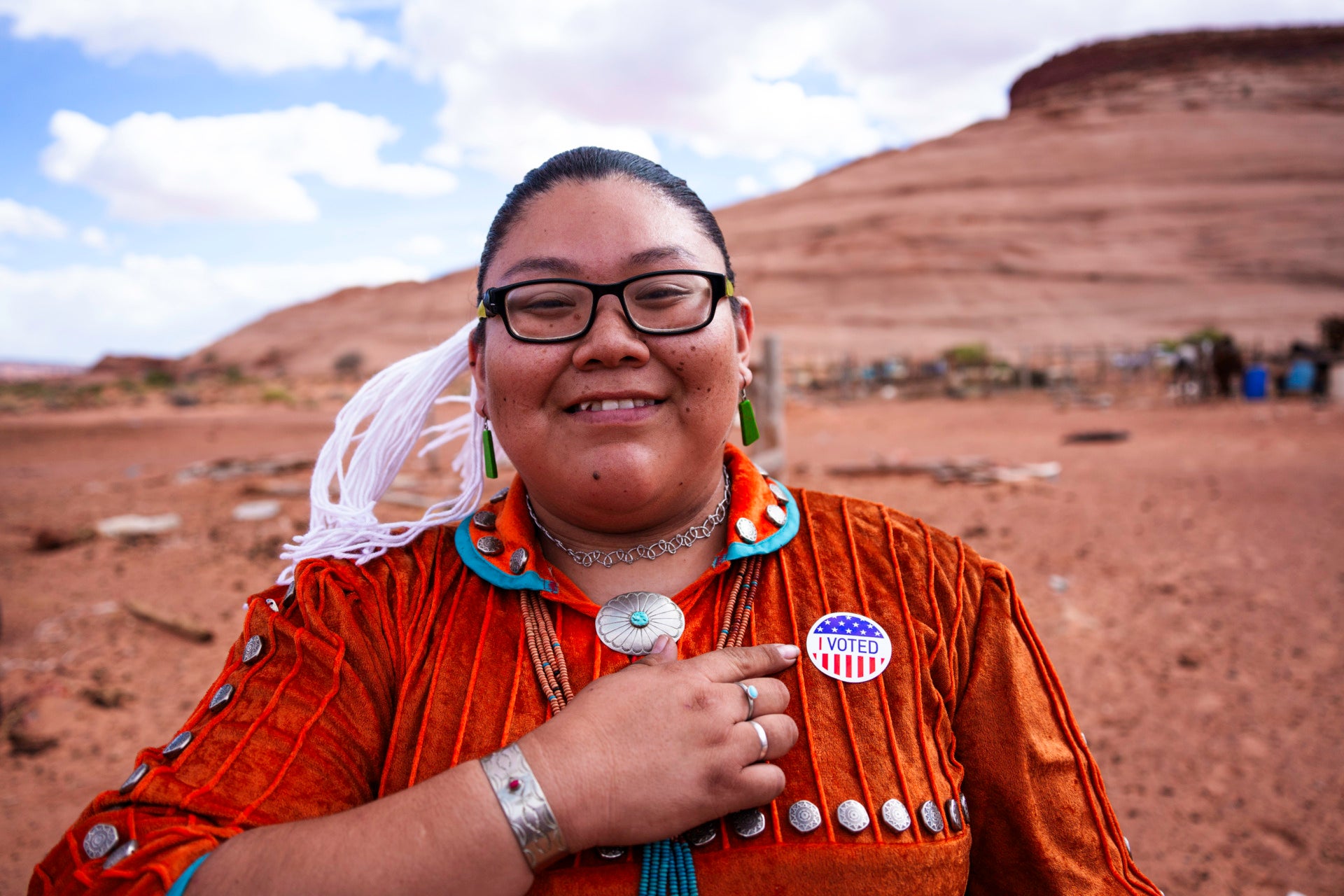Etan Thomas was not your average pro athlete. During his nine-year NBA career through 2011, largely spent with the Washington Wizards, he created a reputation as a social activist and frequently spoke out on issues such as police brutality, the Iraq war, and the government’s reaction to Hurricane Katrina.

Etan Thomas
This year, Thomas wrote the book We Matter: Athletes and Activism, featuring interviews with more than 50 athletes, executives, media figures, and others. Thomas’ goal? To inspire athletes to use their voice to address social justice — a topic he will discuss at the Aspen Institute Sports & Society Program’s sports activism conversation on December 10 in Washington, DC.
In advance of the event, Sports & Society Program Editorial Director Jon Solomon spoke with Thomas about athlete activism in 2018. They discussed the fear black athletes have for their children if they are stopped by police; why Nike invested so heavily in Colin Kaepernick, who protested police killings of black men by kneeling during the national anthem at NFL games; and why the NBA and NFL treat player activism so differently.
Jon Solomon: “Shut up and dribble” became a talking point in 2018 from Fox News’ Laura Ingraham after LeBron James criticized President Donald Trump. But “shut up and dribble” isn’t really anything new in sports, is it?
Etan Thomas: Definitely not. I interviewed athletes who I grew up admiring — like Kareem Abdul-Jabbar and Bill Russell — and they were telling me how they were told to shut up and dribble back in the ’50s and ’60s. The whole notion of stay in your lane comes up when somebody disagrees with you. When they agree with you, it’s OK. One of the reasons Kareem says that happens is the opposition knows the power that the athlete voice possesses and the amount of influence it can have.
Solomon: How much do you think an athlete’s opinion really sways the public?
Thomas: What it does is it brings a different conversation to light to people who never would have looked at this topic seriously. This is probably the strongest feedback I’ve gotten from mainstream America. For a lot of people being stopped by the police and having to fear for your life is just not something that’s your reality. But hearing Dwyane Wade saying he feared for his son’s life from police after Trayvon Martin was killed, that resonated in a different way with mainstream America.
People think athletes are in this protective bubble where the problems of regular society don’t occur. You hear, “What are these athletes complaining about? They make millions of dollars.” Every time a young black man or woman is killed by the police unarmed, mainstream America doesn’t understand that all black people immediately think about our kids. Then you have to have the talk with your kid. “OK, when you’re stopped by the police: no sudden movements, you have to repeat what they say to you, and even if they say go get your wallet, you have to say I’m reaching into my back pocket to get the wallet that you just asked for, is that OK?” Athletes are having these conversations with their kids at 9, 10 years old.
Solomon: You’ve been using your voice for many years. When did you start speaking out?
Thomas: One thing, in particular, happened in high school. I was stopped by the police on my way to a basketball game. They brought a whole lot of police cars and detained me for 45 minutes, and they thought they had seen me on a mug shot somewhere. They actually had seen me because I was in the newspapers playing basketball. I wrote about it for my speech and debate class, and it went all over Tulsa. The newspapers picked it up. People started coming up to me and saying, ‘Thank you for speaking to this because that happens all the time but nobody’s listening to us.’ I’m like, ‘Oh, they just listened to me because I’m playing basketball.’ That’s when it clicked.
Solomon: How would you describe athlete activism today compared to say 10 years ago?
Thomas: It’s definitely changed. Social media has changed a lot of it. Athletes don’t have to wait for a reporter to ask a question where they can give an opinion, or have to trust a reporter to properly convey their thoughts and feelings when they express it to them in an article. Now they can just go to their own social media platform. You also see a lot more athletes unafraid to use their voice. There was fear maybe 10, 20 years ago that doesn’t seem to be there now.
Solomon: Why did some of that fear go away?
Thomas: Maybe it’s social media. You see things going on. Before, we read articles of this person was killed by the police and he was unarmed. Seeing video changes a lot. It’s like when we saw the video of Rodney King (a black man beaten by white police officers in 1992 and caught on camera). That put a whole different context of police brutality for me.
Solomon: The NBA and WNBA have many players and coaches who speak their mind, and the leagues embrace it. The NFL has taken a whole different approach. Any idea why?
Thomas: It wasn’t always that way (for the NBA). Remember, Mahmoud Abdul-Rauf and Craig Hodges were blackballed from the NBA (in the 1990s due to protests) the same way Kaepernick was from the NFL. I interviewed (NBA commissioner) Adam Silver, and he talked about his appreciation for the history of activism and how he values the thoughts of athletes. I wanted to get him on record — and owners like Ted Leonsis and Mark Cuban, who felt the same — because there’s this fear that has spread throughout younger players that if you speak out, you’re going to get in trouble.
In the NFL, I tried to interview (commissioner) Roger Goodell. I wanted to interview (Washington Redskins owner) Dan Snyder and (Dallas Cowboys owner) Jerry Jones. None of them ever returned my calls. NFL players will tell you there’s this fear that teams kind of want players to shut up and play. There’s this notion that if you speak out, you’re rocking the boat or seen as dividing the locker room. The thing that’s interesting to me is the team in the NFL that was probably the most activist was the Philadelphia Eagles. They’re the ones that won the Super Bowl! Their locker room seemed tight-knit, and they talked about having discussions in the locker room.
Solomon: What’s the dynamic like in a locker room when a player takes a public activist position? Are there really interesting conversations happening behind the scenes?
Thomas: I tell people all the time: we had amazing conversations. Maybe people had amazing conversations with me because they knew I was interested in this. But I could go down the list— (former Washington Wizards star) Gilbert Arenas, he would come to my room and ask me different things about the election process. I would have great discussions with our trainer, Steve Stricker. He’d be like, “Let me just tape your ankle.” I’m like, “No, I want to hear what you have to say about this.” But it wasn’t a divisive thing. It all depends on your presentation.
People think that a locker room is devoid of what’s going on in real life. But the same conversations that are happening in society when something happens are the same conversations happening in a locker room. (Golden State Warriors coach) Steve Kerr talked to me about having a whole open dialogue after the (2016 presidential) election and just letting guys vent and talk. That’s what they did for the whole practice.
Solomon: The main question we’re looking at for our Dec. 10 panel is if more athletes spoke up on matters of public importance, what would be the implications? Any thoughts?
Thomas: A common thread through all the athletes I interviewed is you have to expect the criticism is going to come, and you have to be OK with that criticism. That’s a different thing about this younger generation. I talked to (NBA players) Russell Westbrook and Jamal Crawford and asked if they cared about the criticism. They said, “No, we get criticized every day. Twitter is nothing but criticism.”
Solomon: Nike bet significantly on Colin Kaepernick by making him the face of its ad campaign. Nike doesn’t do anything without a lot of market research. Any thoughts on what Nike sees in America today or moving forward to tie itself to Kaepernick?
Thomas: This is a little bit complicated. On the one hand, people were excited for Nike doing this because all of the mainstream Americans who were so much against Kaepernick wanted him completely cut off from any form of financial stability so they could say, “If you speak out, that’s what could happen to you.” Nike kind of ruined that narrative. So, thanks, Nike.
But then on the flip side you look at Nike and say, wait a minute now, Nike just kind of made a business decision. They looked at their demographic and said is the Make America Great Again crowd the ones waiting on the next LeBron shoe? Are they the ones who are going to wear the Nike apparel? They’re not the demographic. They went with this (other) demographic, who is also supporting Kaepernick. Sure enough, when they did it, all of their merchandise sales went up. They made a good business decision.
Solomon: Do you think there’s a risk for Kaepernick of losing any credibility on his stance by getting paid for it in a marketing campaign?
Thomas: I definitely don’t. I’ve heard that before. I don’t know why. It doesn’t change the work he does. Now, if he comes back after that and changes his whole position and says can’t we just all get along – now that would have been you’re switching because of a Nike endorsement. But since his position is the same, that just means more people sees his position. His face is now synonymous with resistance.
Solomon: Players who kneel during the national anthem have made clear what they are protesting and it’s not intended to disrespect the military or the American flag, but the message got changed by others, including President Trump. How do you recommend players use their voice given that the president is willing to say just about anything?
Thomas: Sometimes when somebody is dedicated to misunderstanding and misrepresenting you, that doesn’t mean people can’t still hear you. When you go to rallies or protests, you see people across cultures and races wearing Black Lives Matter because it resonates with them, even if it might not be their reality.
Solomon: The counterargument is some people do find kneeling disrespectful, even if that wasn’t the intent. What do you say to that?
Thomas: When (Kaepernick) specifically said, “It’s not about the military, I have respect for the military, and I have family in the military,” that should be kind of the end of that whole thing. It’s the same thing as people saying to protest on your own time. Well, if I do it on my own time, nobody’s going to see it! The whole point of a protest is to make people uncomfortable and bring the message you’re trying to convey to them while you have their attention.
Solomon: How do you think Kaepernick will be remembered 30 or 40 years from now?
Thomas: Right now, in a lot of mainstream America, Kaepernick is looked at as a troublemaker – all those different adjectives they used to describe Muhammad Ali. Decades from now, he’ll be widely respected like Ali. The whole history book will be written differently, and people in our generation will be like, ‘Wait a minute. That’s not how they were treating Kaepernick back then.’”
Solomon: One area where athlete activism occurs a lot less is in college sports. We’ve seen it a little more recently, such as at Northwestern, Missouri, Oklahoma, Grambling, and Wisconsin. What do you think holds back college athletes from protesting?
Thomas: With college athletes, it kind has to be done collectively, just like with the WNBA. They can be very effective when they do everything together. You’re so expendable in college if you’re not one of the star athletes.
Solomon: Did you speak out publicly while at Syracuse?
Thomas: I did. When I first got there, there was a big protest going on about campus security being able to use pepper spray. If the black and Latino students got into an argument, they would pepper spray everybody. They weren’t doing that in the white fraternity parties. My photo got in the newspaper from the protest. I remember (Syracuse coach) Jim Boeheim called me into his office. He said, “All I will tell you is that when you do speak out, you have to be able to defend your position. If you’re able to defend your position, then you should continue to speak out.” That was it. That was the position he took with me all four years.
Solomon: In your book, Georgetown University sociology professor Michael Eric Dyson says that athletes in the 1960s and ’70s engaged in social protest and that it has transitioned today to social service. In other words, very few athletes now are being denied an economic opportunity because of their social conscience and their protests are savvy given how much more money is at stake. Is that how you view athlete activism today?
Thomas: I respectfully disagree with what Dr. Dyson was saying. I think activism comes in many different ways. In some ways, it’s Kaepernick taking a knee and getting attention. In some ways, it’s like what the San Francisco 49ers did by actively going to different police departments and having community events. In some ways, it’s the Players Coalition (founded by two NFL players to fight for social justice) coming to DC and lobbying for different laws to be changed. I’m not pitting one against the other because I think they’re all needed.
Watch Future of Sports Activism: Reimagining its Bottom Line on Dec. 10 (10 am-noon ET) at as.pn/SportsActivism. Join the conversation on Twitter with @AspenInstSports using #AspenSportsLab.


